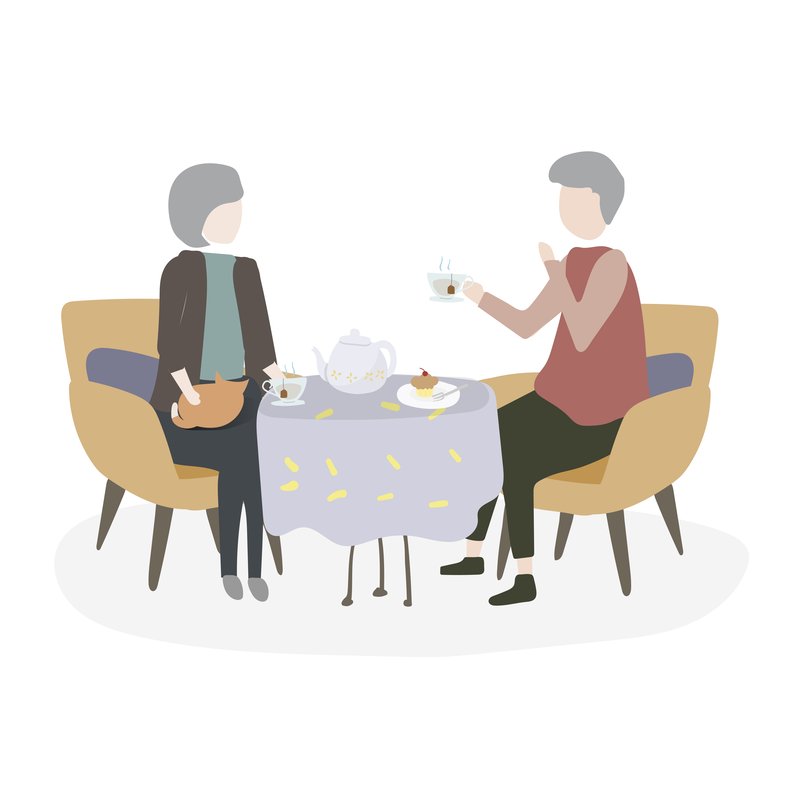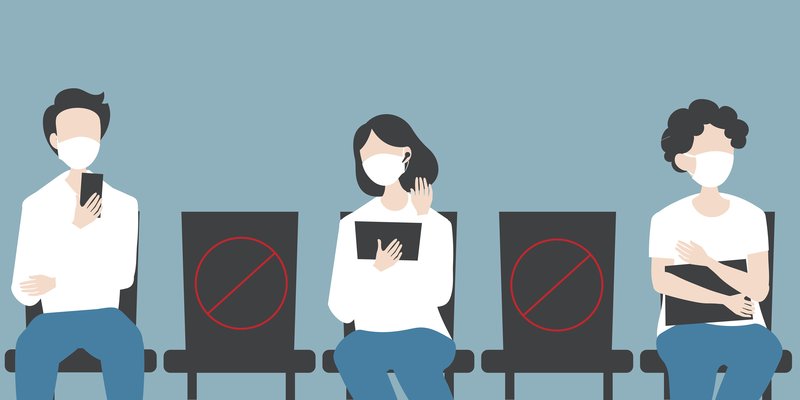Maintaining Autonomy and Preference Throughout COVID-19
How Do We Continue to Meet the Identity and Person Centred Care Needs of Our Residents While Under Covid-19 Restrictions?

Our world has been turned upside down in the past few months.
As much as we’d like to see things ‘go back to normal’, it seems, as the months creep by, the only option we have is to adapt to the ‘new normal, riddled with heavy masks, inorganic family and friend visits, and an ever-changing landscape of pandemic policies and procedures.
While it’s imperative that local and state/provincial guidelines are upheld, and best practices and policies relating to infection control are held to the highest regard, for many of us, we are also starting to see our residents and patients aren’t able to connect with us and others like the used to, language is becoming shorter and more to the point, and our client’s ability to stay focused on tasks is diminishing. We are starting to recognize the significant impact that physical distancing and our protocols are having on the ability to maintain the cognitive and emotional health of our clients, and we are seeing first hand through the ‘new normal’ the challenges we are faced with in upholding our client’s wellbeing and need for comfort and companionship.
Person Centred Universe strives to help organizations achieve true person centred dementia care through strategic development and education, and alongside Planetree International, the international certifying body on person centred care for organizations, we have come together to determine how we can continue to uphold the principles of person centred care while continuing to keep our at-risk elders safe and well as we navigate through these uncharted territories.
Watch our webinar on Maintaining Autonomy and Preference through Covid-19 below.
If you did watch our webinar, you’ll recall there are simple and effective ways that you can weave in aspects of maintaining personhood for your clients, and continue to provide person centred care, even while donning your personal protective equipment and continuing to rely on physical distancing measures.
Life, as we know it, and care homes, as we know them, have changed significantly. A necessity to wear personal protective equipment when coming into contact with individuals, distanced dining, activities, and no visitors bear little resemblance to the bustling care homes working toward person centred care excellence we’ve known and loved. In reality, with the restrictions, and constant changes in effect, we wonder if person centred care will ever be attainable within our organizations again.
The sooner we realize our current reality, and forget about the fact that person centred dementia care is ‘all or nothing’, the sooner we can get back to honouring life history, supporting those we care for, and maintaining those ever-precious minds and hearts of the people that we are responsible for caring for beyond their physical body.
Small steps in the right direction, can and will help those living with dementia to feel less lethargic, will encourage them to express themselves more fully, will help to maintain their identities, and will continue to uphold their strengths.
How can we do that while still maintaining infection control protocols, and without the help of families, friends and volunteers?
We can start by enlisting a few simple tools from our toolkit, ones so many of us already have, but that don’t seem practical to use given the current climate. They are incredibly important, however. We may be in this for the long haul, as we see restrictions starting to lighten in our communities, the likelihood that we will bounce back quickly to the organizations we once were, for many of us, is highly unlikely. We are the keepers of our clients, at this time, we are closer than family and the most tangible support. We have the capabilities to support their psycho/social wellbeing just as we are capable of providing the utmost care and concern for their physical bodies, even through Covid-19.
Again, we would like to preface these suggestions, with highlighting the importance of maintaining your State/Province guidelines and policies, these suggestions are not to over-rule the guidelines put in place, rather to be done as a compliment to the current restrictions put in place to keep our older adult population living with residential living centres physically safe and well.
So, how can we easily and effectively support our clients living with dementia in this difficult time? We have some suggestions and examples we’ve had the pleasure of seeing below.
Connecting to the Person - focusing on strengths:
Life Story – Covid-19, for many of us, has taught us how much we see ourselves through others, and how valuable human connection is to our mental health. For our residents and patients, it’s no different - gathering life story information, or narrative, as we often consider it, is truly the key to getting to know someone, and to love them. Of course it’s important to be well informed on their medical diagnosis, their washroom routines, and any dietary restrictions they may have, however life story and history is just as important to caring for your clients with dementia as understanding their medical history.
How can that practically be applied in your day to day work?
Ask the Recreation Team - Initially, ask the activity director, activity assistant or recreation therapist on your team. They may have key insights and information that will help inform you on the life history of the person.
Ask Them – there is a quote, by Alex Haley ‘each time an older person dies, it’s like a library has burned down’. Your clients and residents are a wealth of knowledge, and although they may not be able to tell you what they had for lunch that day, they often have the most vivid and interesting stories of their past that they are proud to share. While providing care, or during a lull in the hustle and bustle of the day, asking a few probing and prompting questions, can help you to better write the story of the client or resident you’re caring for. Ask questions like ‘Did you have a dog growing up’, ‘What’s it like having three sisters?’, or ‘Tell me about your home’, may garner an incredible story and a key bit of information that will help you to connect with a person again.

Use photographs as cues – during this trying time, where we aren’t able to visit with family and friends who keep our clients and residents living with dementia alive with their family history, photos can be a wonderful resource to remind people of who they are and who they hold close to them as family. A client of ours, at one time, would be able to tell me endless stories about her many older brothers who were very protective of her, and most definitely the troublemakers of the family. In looking at the photos of her brothers, she’d tell me stories about remembering them going off to war, the joy she felt when they returned, the sisters-in-law and nieces and nephews she’d acquired as they grew older, and how proud she was of each and every one of them. Stories like those, that may seem meaningless and insignificant, could then help to sooth her when she was feeling distressed. I’d ask her about the time her brother stole the car from her parents, or the first time she brought her husband home to meet her family, and she would very quickly forget about the distress she was feeling about her surroundings and would be reignited by this vivid and meaningful story.
Responses – When thinking about behavioural responses, remember that behaviours are always attempts to communicate something, and the more we know and understand someone and their needs, the better we can support those behaviours by meeting the needs of our clients. Responses like calling out, or repetitive vocalizations, can be attempts at getting the attention of someone around them. Like one of our clients, who would repetitively call out the same sounds throughout the day. Upon initial inspection, it seemed like that was just ‘what she did’ and how her dementia ‘presented’, but we learned that the more we attended to her and came to her side when she was calling out, the quieter she would become. And, if you held your hand out to her, she would often speak in a very calm and quiet tone and tell you exactly what she wanted, often a glass of water, or something to eat, or sometimes, just to chat with you.
As we continue to work to keep our clients and residents safe, we may see more prominent responsive behaviours as our personal protective equipment (PPE) implicate the human connection our face and our mouths create when people are able to see them. Be prepared to speak slowly, and very clearly, and make a greater effort to touch and connect with your clients through your eyes, what you say, and how you interact, paying particular attention to your openness in your body positioning and hand gestures.

When using PPE - our world now revolves around the use of masks. At the grocery store, we see people wearing masks, at work, to keep our clients safe, we wear masks, on public transit, we wear masks. We have become acclimated to the fact that in current society, masks are and will continue to be prevalent in our day to day lives. Our clients, however, may not have the capability to understand that we are wearing masks and other personal protective equipment as a safety measure, and may not recall, even when told, that we are currently living through a pandemic. For each interaction you have with your clients or residents living with dementia, try a few simple person centred practices to help with the ‘Yellow Blob’:
- If at all possible, allow the person you’re visiting or caring for see you before you don your PPE. Let them see your face (from a distance) and smile.
- Be mindful of your body language - openness is key by opening your arms.
- When speaking, be as clear as possible. Think about the easiest way you can ask someone what you need them to do. Try to be direct but comforting in your communication. If someone has trouble hearing, speak loudly and clearly.
- If at all possible, laminate a name-tag with your picture and name on it. If at all possible, laminate a name-tag with your picture and name on it.
- Be as expressive with your eyes and your body as possible. If you need to do a little jig to make someone feel more relaxed, you’ve got lots of room in your PPE gown!
Preferences - The way we provide care has been completely turned upside down since implementation of Covid-19 protocols and new processes for physical distancing in healthcare has become the norm. As care partners, even we find it tough to adapt to the ever-changing landscape of what it looks like to provide physical care for someone, imagine what it must feel like for those living with dementia who may not have a clear understanding of the implications of the pandemic, and very possibly, may not remember that it is our new reality.
There are a number of ways we can continue to maintain personal preferences for our patients and residents that are as easy to adapt or implement into our regular care routines.
Meaningful Engagement - meaningful engagement is incredibly important as we adapt our psycho/social and recreational interventions to meet the requirements of physical distancing and client cohorting. Taking a bit of time to tease out a person’s interests, and creating a small ‘engagement box’ with items like laminated photographs with captions, books, music and other items, is a great way for residents and patients to participate in self directed activities while still maintaining the physical distancing guidelines. Taking a bit of time to work with your client, to understand their occupational interests, like if they were a homemaker, providing them the opportunity to make their own bed every day, and fold their own clothing, and matching their socks, is an easy way to engage someone in a familiar task while abiding by regulations.
Care Practices - maintaining autonomy and providing preference during care practice can help both the care giver and care receiver to have a more meaningful experience during care. Encouraging the person you’re caring for to ‘lead the way’ by using cues, and a hand-over-hand approach to daily tasks, like brushing their hair, putting on lotion or make up, and brushing their teeth, are ways that you can provide the opportunity for preference, and for autonomy during care.

Mealtime Experience - When we think about sitting down for supper - for most of us, the mealtime experience is that of a social event. We ask family and friends around the table how their day was, we recap stories and memories, and usually talk about relevant happenings and interests. Providing that opportunity during the mealtime experience for residents and patients, is a great way to maintain preference. Encouraging them to lead the discussion at the dining table, by asking about their favourite food, what their favourite meal to cook was, or asking them if they’ve ever caught a fish, are great ways to engage your client during the mealtime experience in a conversation that they can follow and may be able to lead. Encouraging them to lead the discussion will give you an indication of what they feel comfortable discussing, even if it’s past reminiscence and discussion about events that had happened in the past.
Family Contributions – Families are often the ‘silent’ partners in care for our clients and patients and intrinsically maintain the identity and autonomy of our clients living with dementia. With the restrictions imposed on visitors across the world due to Covid-19, families, and their very important role as care partners, are left feeling helpless and struggling to understand where they belong in the healthcare of their family member as they’re not able to visit and spend time with their loved one. Clients living with dementia may or may not be able to put their finger on the fact that their usual complement of visitors aren’t coming any longer, but they are often aware that someone or something is missing. How can we continue to maintain the relationships between family and friends to help support the autonomy and identity of our clients by getting innovative with the help of family and friend care partners especially if these restrictions continue to be imposed as other aspects of our community begin to open up and return to the new normal?
Here are a few innovative examples:
Skype/Facetime/Zoom for Healthcare - the ‘new normal’ has certainly changed how we would typically interact and engage with our family and friends, but we’ve quickly had to adapt to the new world of technology, and we as healthcare organizations and professionals, have often adapted along with it. Using apps on iPads and laptops will help keep clients and patients connected with family and friends. Currently, throughout the United States, Civil Money Penalties (CMP) programs are providing funds to purchase iPads and Technology for Resident Use in Assisted Living and Skilled Nursing Facilities. You can learn more about the program here.

Video and Voice Recordings - Video chats and conversations are a wonderful way to support your clients and residents, and pre-recorded video and voice recordings can help during trying time to provide reassurance and ‘ground’ our clients living with dementia to feel supported and more comfortable. Using these pre-recorded videos and recordings can help with relationship building for staff, and can help clients and residents living with dementia to feel more settled and secure by hearing a familiar voice with a familiar message.
Telephone Calls with Prompting Questions & Discussion - Telephone calls that encourage reminiscence and discuss old stories can help maintain identity for individuals living with dementia, and remind them of their unique experiences through life and their contributions to the world. Encouraging families and staff to use reminiscence and narrative to draw out deeply seated stories is a great way to build relationships and hold wonderful emotionally-filled memories.
Letter Writing - Who doesn’t love receiving a personally addressed letter? Letter writing will also encourage reminiscence and can be used as a tool and revisited whenever the individual living with dementia may feel compelled to read it.
Lawnchair Visits - Just like you would at a bonfire, encourage family members to pull up a chair by a ground floor window that continues to keep the individual safe, but also allows for the individual to see their loved one and hear their voice. Don’t forget to continue to maintain 6 feet distance! If weather is a factor and the client finds it difficult to hear what their visitor is saying, perhaps a telephone or speaker will amplify their loved ones voice so they can hear better.
Team Discussion - Communication amongst team members is always an important aspect to delivering quality person centred dementia care, yet during the Covid-19 pandemic, we have realized just how important it is to communicate effectively and have tight communication processes within organizations. Some organizations are boosting their ‘huddles’ where staff from all departments come together for a few minutes each day to determine a ‘game plan’ for the delivery care and service to patients and residents. To maintain the identity and autonomy needs of those we care for, utilizing care plans to communicate capabilities, like using a hand over hand approach at meals or clear, direct sentences to do daily personal care can help maintain the capabilities of our clients when they may be struggling daily with who they are and why they’re under our care.

Establishing these processes, and applying person centred care practices, as we identified here, can be easy to do and result in a very positive impact for your patients/residents. In recognizing the importance of delivering autonomy and encouraging preference for clients in long term care can easily be accessible, as identified here, even under the current Covid-19 restrictions. The key is adaptability, focusing on strengths of your clients, and appreciating their unique capability to contribute to this world, which can be delivered when breaking these philosophies down into easy to deliver methods of caregiving that cater to the whole person.
These suggestions are not meant to be an exhaustive list of ways to implement person centred dementia care, but instead an attempt to provide suggestion and spark thoughts around how we can integrate some of those principles of person centred dementia care we practiced so freely before Covid-19 changed our views on care. Do you have topics you’d like to have us cover in webinars or through blog posts? We’d love to hear them! Contact us for more information.
